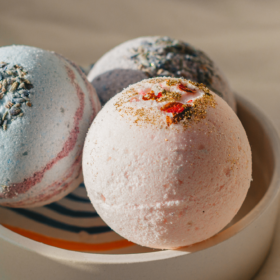
Intimate washes – are they safe and should we use them?
In this article
What's the lowdown?
Vaginas naturally have their own scent caused by sex hormones called pheromones
Excessive cleaning is unnecessary and potentially harmful, as vaginas possess their own set of self-cleaning powers
Most intimate washes, while marketed as natural, safe for sensitive skin, moisturising, bacteria-fighting, anti-inflammatory and pH-balancing, often cause more harm than good
The best way to maintain the health and cleanliness of your vagina and vulva is by using clean water to wash externally, no more than one to two times per day
Most intimate washes, while marketed as natural, safe for sensitive skin, moisturising, bacteria-fighting, anti-inflammatory and pH-balancing, often cause more harm than good. Here we share why it’s not necessary to use intimate washes and the side effects of excessively washing your vagina.
What is an intimate wash?
Intimate washes, or vaginal washes, are cleaning solutions specifically formulated for and marketed towards cleansing the ‘intimate area’, AKA, the vulva. Not to be confused with the vagina, the vulva refers to the external genital area; including the clitoris, inner and outer labia (minora and majora), the urethral opening and vaginal opening.
These ‘feminine hygiene’ (lol) products are usually found in the section of a store alongside other menstrual products. Chances are you’ve already heard a thing or two about these magical washes that reportedly make your vulva feel or smell fresh and clean; the feminine hygiene wash market is set to grow by 6%, up to $123 million, from 2020-2024. The ‘feminine hygiene’ product market as a whole is worth $40 billion in 2021 and projected to grow to almost $55 billion by 2028.
Intimate washes are supposedly safer and healthier for your vulva than a typical body wash, and are directed for external use only. You might therefore be tempted to use an intimate wash to combat vaginal discharge, but let us stop you right there. Pretty much all of us have discharge, and for good reason. Discharge is perfectly natural, and necessary for keeping the vagina clean, lubricated, and protected against infection.
What causes vaginal discharge?
Vaginal discharge is controlled by your natural sex hormones, oestrogen and progesterone, which fluctuate throughout your menstrual cycle – hence the change in colour, consistency and amount of discharge throughout the month. Vaginal discharge is actually really important for fertility and changes to allow sperm to more easily swim through it towards an egg around the time of ovulation. Hormonal contraception methods can cause discharge to vary a bit, with many users reporting more vaginal discharge, and conversely vaginal dryness, as possible side effects. You can filter our reviews by side effect to see for yourself!
A healthy vagina contains beneficial bacteria called lactobacilli that help it to maintain the ideal acidic pH, which ranges from about 3.5-4.5. Keeping the vagina at this pH helps to prevent the buildup of infection-causing harmful bacteria. In general, discharge from a healthy vagina should be mildly scented, clear, or milky white in colour, and thick, sticky, or slippery and wet in texture.
Should I wash my vagina?
While the idea of having a vagina that smells like fresh flowers may be enticing, the truth is that vaginas naturally have their own scent as a result of a set of sex hormones called pheromones. Excessive cleaning is unnecessary and potentially harmful, as vaginas possess their own set of self-cleaning powers.
Side effects of using feminine wash
One of the main causes of disrupting the sensitive environment of the vagina is by over washing it and stripping away the healthy bacteria it contains (lactobacilli) which help to fight against infections.
When a woman washes inside their vagina, or douches, they run the risk of disrupting their natural pH, which can result in irritation, or conditions such as bacterial vaginosis or thrush.
Studies show that using cleaning methods that strip the vagina of its natural microbiota actually increases the risk of these infections by anywhere from 8-20%.
A 2018 study found that participants who reported using feminine washes/gels had almost 3.5 times higher odds of reporting BV and almost 2.5 times higher odds of reporting a UTI. In the most extreme conditions, douching in the presence of an STI could increase the risk of pelvic inflammatory disease.

What about natural washes – are they safe?
Recently, companies such as AH!YES and Love Wellness Co. have launched intimate washes that claim to be gentle enough for everyday use without causing infection. They are marketed as ‘matching vaginal pH’ and are composed of all natural, organic and hypoallergenic ingredients.
However, most of these products still contain perfumes and alcohols meant to make the area feel more fresh and clean, but can dry out and irritate the sensitive vulva.
The internet also contains a plethora of recipes for DIY vaginal washes, which promote the use of ingredients such as witch hazel, coconut oil, essential oils, castile soap and rose oil.
Again, these ingredients can be just as stripping and irritating for the vulva as the artificial ingredients found in store-bought washes. Using an intimate wash that majorly affects the pH of your vagina may affect more than just its natural infection-fighting mechanisms, as a pH imbalance can damage sperm and prevent it from fertilising an egg.
Our mantra is: if you use it to unblock a sink, don’t put it on your vulva – even if it’s a ‘natural’ cleaner.
How to clean your vulva
The best way to maintain the health and cleanliness of your vagina and vulva is by avoiding intimate washes, perfumed and non-perfumed soaps, deodorant and hygiene wipes.
Instead, use plain old, clean water to wash externally, no more than one to two times per day. Yep, you heard that right; the best way to clean your vulva is with water. That’s it!
Our medical review process
This article has been medically reviewed for factual and up to date information by a Lowdown doctor.

